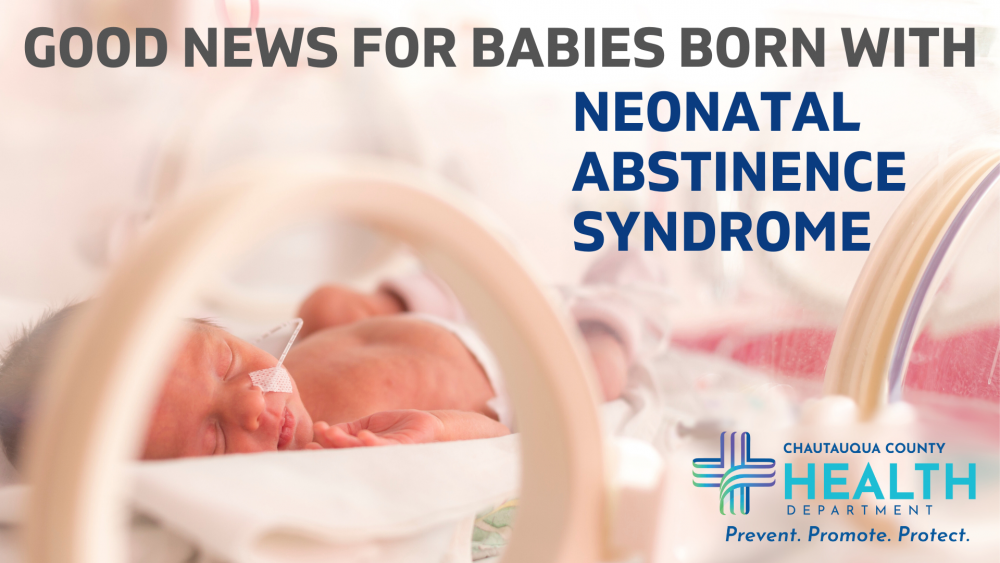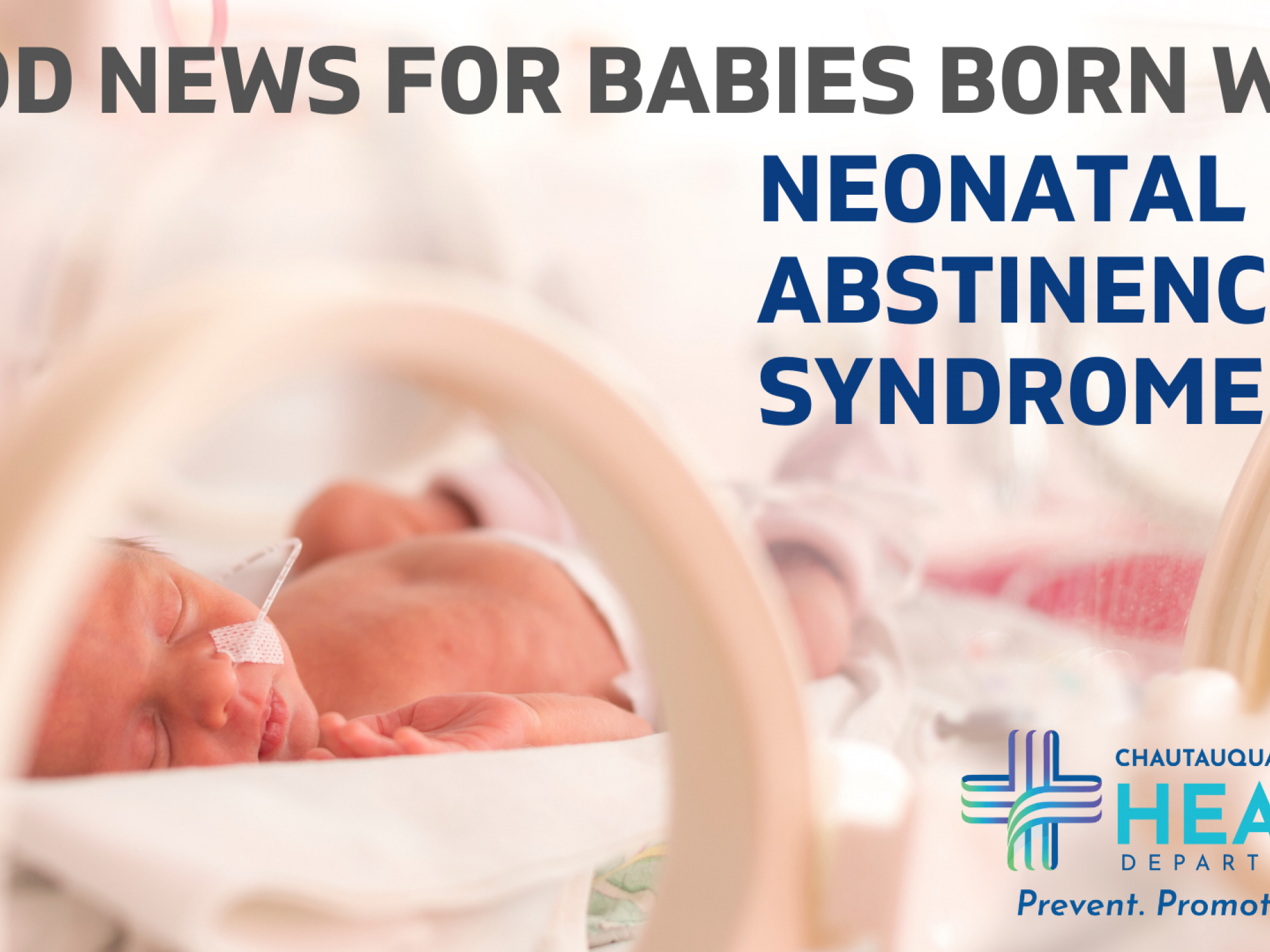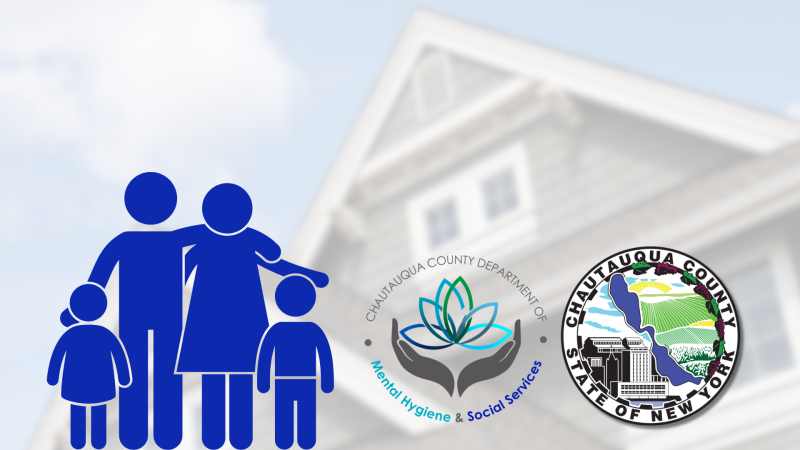
MAYVILLE, NY — As National Children’s Health Month comes to a close this October, The Chautauqua County Health Department (CCHD) wants to take this opportunity to highlight the significant work being done to address Neonatal Abstinence Syndrome (NAS), a syndrome that has been recognized for more than 50 years affecting many newborns right here in Chautauqua County. The New York State Department of Health (NYSDOH) recognizes the importance of Early Intervention services for children with NAS and will now allow them to automatically qualify for the services provided through the CCHD.
According to the NYSDOH Opioid Data Dashboard, Chautauqua County has a higher rate of babies diagnosed with neonatal withdrawal syndrome or affected by maternal use of drugs of addiction than statewide comparison groups. NAS occurs when newborns experience withdrawal symptoms after exposure to opioids, antidepressants, barbiturates or benzodiazepines (sedative medications) during pregnancy. Some of the signs of withdrawal, including tremors, irritability, sleep problems, seizures, typically emerge within 72 hours after birth. Factors influencing the severity of symptoms include the type and amount of substance exposure, the timing of substance use, and whether the baby is born full-term or premature.
For the first time, children with NAS are eligible for CCHD’s Early Intervention Program, which ensures that children affected by exposure are connected with health resources, in-home support, and intervention strategies earlier, which results in improved health outcomes, faster.
Amy Snyder who provides Occupational Therapy services for the CCHD’s Early Intervention Program is in full support of this addition. Amy explains, “This new automatic qualifier means babies can be seen immediately and not wait for a doctor or hospital referral and then have to go through the longer evaluation process. The therapist can assess the developmental status of the baby at each visit and provide suggestions to the caretakers in a timely manner. Babies born positive are more at risk for developmental delays. They often have difficulty with regulatory skills and are not adept as self-soothing; they can be irritable and jittery and present with feeding issues such as poor sucking skills. It is much easier to red flag an atypical movement or sign and prevent it from becoming a pattern then go back and fix it once it is part of the child's repertoire.”
The Early Intervention Program staff work with children and their families from birth to age three and offer help and support to promote development based on the child’s individual needs. Services are provided at no cost to the child’s family and include developmental evaluation, home visits, speech, physical and other therapies.
“Advocating for and working with the most vulnerable amongst us is very meaningful work for us at the Health Department. Promoting the health and improved futures of our children is not only central to the work we do as a department, but is essential to our public’s health. We are thrilled to be able to reach more babies and families earlier,” states Lacey Wilson, Chautauqua County’s Public Health Director. “Our EI program is only one of our many wonderful moms and babies health programs aimed at promoting happy and healthy lives and preventing poor outcomes. We are thrilled to be able to expand our reach in this way, as we continue to work alongside our community partners to ensure a healthier future for our children!”
The Early Intervention Program offers services to support families with children, including:
- Health Resources: Providing resources related to developmental conditions associated with NAS, such as prematurity, seizures, gastritis, and failure to thrive.
- In-Home Support: Working with the child in their home environment within the context of the child's and family’s daily routines and activities.
- Strategies and Interventions: Assisting families in identifying specific strategies and interventions, such as feeding difficulties, adapting to sensory stimuli, sleeping, learning, and social interaction.
- Connection to Resources: Facilitating referrals to services that address substance misuse, mental health, medical care, and other supports.
For more information about the CCHD’s Early Intervention Program, please visit HealthyCHQ.com/Kids.
For more information on NAS, visit the Center for Disease Control and Prevention website at: https://www.cdc.gov/opioid-use-during-pregnancy/about/.
About Chautauqua County Health Department - The Chautauqua County Health Department is the leading Public Health organization in Chautauqua County dedicated to the support of the community’s health. The Health Department takes innovative approaches to provide technical assistance to partner organizations, and offers various programs and services in order to help prevent disease, protect the public’s health and promote our community’s overall health and wellness. For more information visit www.HealthyCHQ.com.







